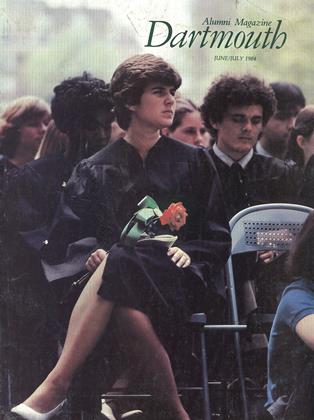What if they held a major international event and the news media didn't come?
That happened on campus in mid-May, when an important gathering of American and Soviet leaders took place and the hordes of journalists one might expect to cover such an occasion were notable only by their absence. They weren't covering it because of the extremely hush-hush nature of the event, the 14th in a series of informal, off-the-record talks among leading citizens, academics, government officials, and business leaders from the United States and the Soviet Union. Ancl not only was the 14th conclave held at the College, but the discussions are known as "The Dartmouth Conference."
Begun in 1960 at the urging of President Eisenhower, the Dartmouth Conference has been held in Hanover three times in its first year, in 1972, and this spring. The conferences are administered by the Kettering Foundation, which publishes the substance of the proceedings some time after each gathering. The sessions, however, are not open to the public or the media and no public statements are issued. The Kettering Foundation explained that the conferences have served as "a significant unofficial channel to search for means to minimize the conse- quences of differences between the superpowers." The talks have helped keep communications between the two countries open through such international crises as the downing of a U-32 spy plane over the Soviet Union, the Berlin Crisis of 1961, and the Vietnam War.
The agenda for the four-day 1984 conference included political relations, arms control, economic relations, and regional conflicts. The participants 18 Americans and 12 Russians were Co-chaired by Norman Cousins, former editor of Saturday Review and an adjunct professor in medical humanities at UCLA, and by Georgi Arbatov, director of the Institute of USA and Canada Studies, the main Soviet think-tank for American-Soviet relations.
Mathematician C. Dwight Lahr, newly-named dean of the faculty of arts and sciences at the College, will not be leaving the blackboard behind him as he assumes hisnew duties on July 1. He intends to continue teaching one course a year as well as towork administratively on issues involving curriculum and faculty recruitment.
 View Full Issue
View Full Issue
More From This Issue
-
 Feature
FeatureProfessor John Stearns '16: Rara Avis Una
June | July 1984 By Eddie Chamberlain '36 -
 Feature
FeatureCreativity: The Open Dance at Dartmouth
June | July 1984 By Prof. Blanche Gelfant -
 Feature
FeatureWearers of the Green
June | July 1984 By Jim Kenyon -
 Feature
FeatureThe Best Part of My Academic Life Here
June | July 1984 -
 Feature
FeatureMaking it Happen
June | July 1984 By Peggy Sadler -
 Feature
FeatureThe Quiet Good Man
June | July 1984 By Young Dawkins '72
Article
-
 Article
ArticleSTANFORD COMES EAST
NOVEMBER 1931 -
 Article
ArticleStaff Promotions
DECEMBER 1968 -
 Article
ArticleScholarly Passions
JANUARY 1999 -
 Article
ArticleClubs (alumni) host Club (Glee)
JUNE 1982 By Maria Laskaris -
 Article
ArticleAN ACADEMIC HUNDRED THOUSAND
November, 1930 By President Hopkins -
 Article
ArticleFaculty
APRIL 1972 By ROBERT B. GRAHAM '40

